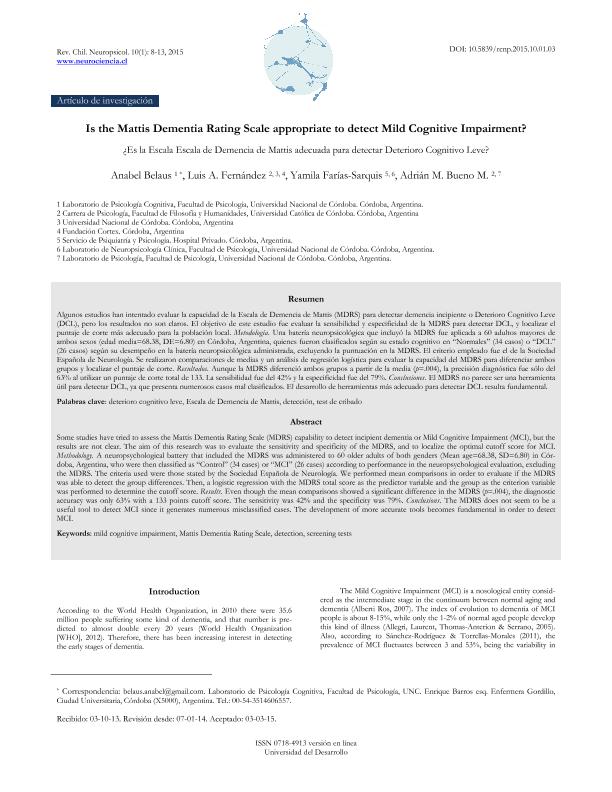Mostrar el registro sencillo del ítem
dc.contributor.author
Belaus, Anabel

dc.contributor.author
López Fernández, Luis Alberto

dc.contributor.author
Farias Sarquis, Yamila
dc.contributor.author
Bueno, Adrián Marcelo

dc.date.available
2019-02-22T17:28:17Z
dc.date.issued
2015-06
dc.identifier.citation
Belaus, Anabel; López Fernández, Luis Alberto; Farias Sarquis, Yamila; Bueno, Adrián Marcelo; Is the Mattis Dementia Rating Scale appropriate to detect Mild Cognitive Impairment?; Universidad de La Frontera; Revista Chilena de Neuropsicología; 10; 1; 6-2015; 8-13
dc.identifier.uri
http://hdl.handle.net/11336/70711
dc.description.abstract
Algunos estudios han intentado evaluar la capacidad de la Escala de Demencia de Mattis (MDRS) para detectar demencia incipiente o Deterioro Cognitivo Leve (DCL), pero los resultados no son claros. El objetivo de este estudio fue evaluar la sensibilidad y especificidad de la MDRS para detectar DCL, y localizar el puntaje de corte más adecuado para la población local. Metodología. Una batería neuropsicológica que incluyó la MDRS fue aplicada a 60 adultos mayores de ambos sexos (edad media=68.38, DE=6.80) en Córdoba, Argentina, quienes fueron clasificados según su estado cognitivo en “Normales” (34 casos) o “DCL” (26 casos) según su desempeño en la batería neuropsicológica administrada, excluyendo la puntuación en la MDRS. El criterio empleado fue el de la Sociedad Española de Neurología. Se realizaron comparaciones de medias y un análisis de regresión logística para evaluar la capacidad del MDRS para diferenciar ambos grupos y localizar el puntaje de corte. Resultados. Aunque la MDRS diferenció ambos grupos a partir de la media (p=.004), la precisión diagnóstica fue sólo del 63% al utilizar un puntaje de corte total de 133. La sensibilidad fue del 42% y la especificidad fue del 79%. Conclusiones. El MDRS no parece ser una herramienta útil para detectar DCL, ya que presenta numerosos casos mal clasificados. El desarrollo de herramientas más adecuado para detectar DCL resulta fundamental.
dc.description.abstract
Some studies have tried to assess the Mattis Dementia Rating Scale (MDRS) capability to detect incipient dementia or Mild Cognitive Impairment (MCI), but the results are not clear. The aim of this research was to evaluate the sensitivity and specificity of the MDRS, and to localize the optimal cutoff score for MCI. Methodology. A neuropsychological battery that included the MDRS was administered to 60 older adults of both genders (Mean age=68.38, SD=6.80) in Córdoba, Argentina, who were then classified as “Control” (34 cases) or “MCI” (26 cases) according to performance in the neuropsychological evaluation, excluding the MDRS. The criteria used were those stated by the Sociedad Española de Neurología. We performed mean comparisons in order to evaluate if the MDRS was able to detect the group differences. Then, a logistic regression with the MDRS total score as the predictor variable and the group as the criterion variable was performed to determine the cutoff score. Results. Even though the mean comparisons showed a significant difference in the MDRS (p=.004), the diagnostic accuracy was only 63% with a 133 points cutoff score. The sensitivity was 42% and the specificity was 79%. Conclusions. The MDRS does not seem to be a useful tool to detect MCI since it generates numerous misclassified cases. The development of more accurate tools becomes fundamental in order to detect MCI.
dc.format
application/pdf
dc.language.iso
eng
dc.publisher
Universidad de La Frontera
dc.rights
info:eu-repo/semantics/openAccess
dc.rights.uri
https://creativecommons.org/licenses/by-nc-sa/2.5/ar/
dc.subject
Mild Cognitive Impairment
dc.subject
Mattis Dementia Rating Scale
dc.subject
Detection
dc.subject
Screening Tests
dc.subject.classification
Psicología

dc.subject.classification
Psicología

dc.subject.classification
CIENCIAS SOCIALES

dc.title
Is the Mattis Dementia Rating Scale appropriate to detect Mild Cognitive Impairment?
dc.type
info:eu-repo/semantics/article
dc.type
info:ar-repo/semantics/artículo
dc.type
info:eu-repo/semantics/publishedVersion
dc.date.updated
2019-02-04T13:09:36Z
dc.identifier.eissn
0718-4913
dc.journal.volume
10
dc.journal.number
1
dc.journal.pagination
8-13
dc.journal.pais
Chile

dc.description.fil
Fil: Belaus, Anabel. Consejo Nacional de Investigaciones Científicas y Técnicas. Centro Científico Tecnológico Conicet - Córdoba. Centro de Investigaciones y Estudio sobre Cultura y Sociedad. Centro de Investigaciones de la Facultad de Psicología - Grupo Vinculado CIPSI; Argentina
dc.description.fil
Fil: López Fernández, Luis Alberto. Consejo Nacional de Investigaciones Científicas y Técnicas. Centro Científico Tecnológico Conicet - Córdoba. Centro de Investigaciones y Estudio sobre Cultura y Sociedad. Centro de Investigaciones de la Facultad de Psicología - Grupo Vinculado CIPSI; Argentina
dc.description.fil
Fil: Farias Sarquis, Yamila. Consejo Nacional de Investigaciones Científicas y Técnicas. Centro Científico Tecnológico Conicet - Córdoba. Centro de Investigaciones y Estudio sobre Cultura y Sociedad. Centro de Investigaciones de la Facultad de Psicología - Grupo Vinculado CIPSI; Argentina
dc.description.fil
Fil: Bueno, Adrián Marcelo. Consejo Nacional de Investigaciones Científicas y Técnicas. Centro Científico Tecnológico Conicet - Córdoba. Centro de Investigaciones y Estudio sobre Cultura y Sociedad. Centro de Investigaciones de la Facultad de Psicología - Grupo Vinculado CIPSI; Argentina
dc.journal.title
Revista Chilena de Neuropsicología
Archivos asociados
